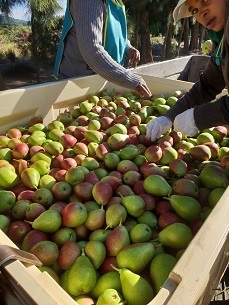 South Africa is entering the second half of its pear export season, almost 24.5 million cartons of 12.5kg volume exported since the first week of the year, most of these bound for the Far East and Asia.
South Africa is entering the second half of its pear export season, almost 24.5 million cartons of 12.5kg volume exported since the first week of the year, most of these bound for the Far East and Asia.
China is a nascent market for South Africa, having opened only two years ago. South Africa's Forelles get the largest traction there but, as Gysbert du Toit of the eponymous family fruit concern points out, there are specificities to exporting pears to China that don't apply to other destinations, such as a shroud covering every pallet. "China is not a free-for-all. It's not so simple to send pears there, but they earn a good return in China. When we look at our Forelle basket, it's more the larger fruit on which we earn a premium in China."
Gysbert du Toit is a fourth-generation member of DuToit Agri that was founded 130 years ago, a celebration discreetly noted on their local supermarket poly bags. DuToit grows pears on 12 farms, a seasoned top fruit exporter since 1998, when the industry was deregulated. He expects India, already prominent for South Africa's pears, to grow in importance, bolstered by the ability to now do onboard sterilization, instead of landside. "India takes a fair amount of our high-colour Forelle pears, some Packhams and a few summer pears."
The more favourable protocol for all South African fruit to India has been a great help, he says, and it was ultimately necessary from both a cost and a quality perspective.
"There is, however, only a very specific period during which we can send to India because of their own production. The Indian market window for South African apples and pears is during the first part of the year as have they own production starting around for apples around July and pears in September. The European and Northern Hemisphere also start around August."
High expectations in Europe not realised
Based on low carry-over pear stock levels in Europe, a strong season was expected there, but those prospects have definitely not realised, he remarks. "Pear prices aren't necessarily low, but sales aren't what was expected. As long as you're in programme business, you're covered, but the wholesale market is very difficult in Europe."
The deciduous fruit industry body Hortgro's figures show a 34% increase (wk24 YTD) in pear exports to Europe. "These figures show that everyone was keen to get into an 'empty' market, which is partly the reason for the higher volume. The reality of disappointing sales started transpiring by the middle towards the end of May."
Most of DuToit's pears sent to Europe go to German retail buyers accepting a couple of varieties – even Packhams, Du Toit notes, as "a bit of a gap filler" – but centred on Forelle and Abate Fetel. "Italy is another large market for our pears, also a variety-specific market, for instance Abate Fetel and bicoloureds but they struggle to match the competitive prices for Forelles elsewhere."
The Comice pear is grown in South Africa specifically with exports to France in mind; apart from a little bit of Abate Fetel, it's the only pear Du Toit sends there.
South Africa's overall pear exports to Russia are 13% above last year this time, with over two million cartons shipped, but their own trade on that market has dropped off a lot, Du Toit says, and it's primarily retail-based now. The dynamics in Russia have changed a great deal since the war, he observes.
Shipping
"We're still far from operating in a comfortable zone," he remarks. "There is a container shortage but then it's not universal, it's depends on the shipping line."
Like everyone else they've increased the amount of fruit they send to Europe, the UK and, to a lesser extent, to Russia by breakbulk over the past two or three years. It is a means to avoid the state-run Cape Town port terminal (recently ranked lowest again in a World Bank review) and to guarantee arrival time.
Alas, where the South African pomefruit industry really needs conventional shipping – to the East - there are no breakbulk services currently running. On the receiving end, for instance at many African ports, the challenge exists that they were built to handle containers, not pallets which necessitate cool rooms situated close-by. For more information:
For more information:
Gysbert du Toit
DuToit Agri
Tel: +27 23 312 1071
Email: [email protected]
https://www.dutoitagri.co.za/
